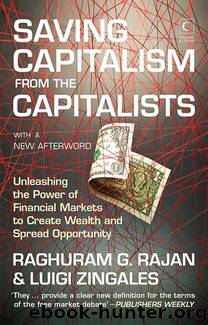Saving Capitalism From the Capitalists: Unleashing the Power of Financial Markets to Create Wealth and Spread Opportunity by Raghuram G Rajan & Luigi Zingales

Author:Raghuram G Rajan & Luigi Zingales
Language: eng
Format: epub, azw3
Tags: Economics, Business & Economics, General
ISBN: 9789351362098
Publisher: HarperCollins Publishers India
Published: 2013-12-23T18:30:00+00:00
Cross-border capital flows fell precipitously, for reasons we will come to, in the decades between 1930 and 1980 and started increasing only in the last part of the century. By the end of the century, they had regained the levels (relative to measures of economic activity such as world gross domestic product) that they had at the beginning of the century. A graph for 1997 similar to the one presented here for 1913 shows a similar pattern. Countries that were more open to trade at the beginning and the end of the century had deeper financial markets.
More analysis of the data suggests that the positive relationship between trade openness and the size of a country’s equity market is much weaker, or nonexistent, in the period between 1930 and 1980, when cross-border capital flows were much smaller. Thus, both crossborder trade and capital flows may indeed be necessary for financial development.
Of course, all we have documented are correlations between openness and the size of capital markets. Econometric techniques show that the former is likely to cause the latter.38 Even so, this is only an indirect verification of the possibility that open borders curb the power of incumbents. The skeptical reader will want more direct evidence that openness influences financial development—in particular, that it works because it curbs the power, or alters the incentives, of incumbents.
There is such evidence. As described earlier in the book, Forbes magazine publishes a list of billionaires around the world every year, classifying them as those who inherited their wealth or those who created it through their own entrepreneurial efforts. We have argued that it is easier for a poor but talented entrepreneur to make it on her own in a developed financial system in which there is widespread access to finance. So in a developed financial system, the fraction of self-made billionaires should be higher. Conversely, in an opaque system, which protects incumbents against competition, it is easier for heirs, however incompetent, to retain their fortunes. As we described in Chapter 5, self-made billionaire wealth is higher in countries with a more transparent and developed financial system. More important, countries with lower barriers to foreign direct investment have a lower ratio of inherited billionaire wealth to GDP and a higher ratio of self-made billionaire wealth to GDP.39
Lower barriers to foreign competition and lower incumbency seem to go together. It is unclear how much this is because countries dominated by incumbents create high barriers to competition penetrating from outside and how much it is because foreign competition erodes the economic might of incumbents. Regardless of the mechanism, the conclusion is clear: foreign competitors seem to make common cause with domestic entrants in making life difficult for domestic incumbents.
This conclusion is bolstered by evidence of the impact of the enactment of the Canada–United States Free Trade Agreement (FTA) in 1988.40 The FTA lowered trade barriers between Canada and the United States and, perhaps more important, eliminated all kinds of discriminatory taxes on investors that had previously limited capital flows between the countries.
Download
Saving Capitalism From the Capitalists: Unleashing the Power of Financial Markets to Create Wealth and Spread Opportunity by Raghuram G Rajan & Luigi Zingales.azw3
This site does not store any files on its server. We only index and link to content provided by other sites. Please contact the content providers to delete copyright contents if any and email us, we'll remove relevant links or contents immediately.
The Black Swan by Nassim Nicholas Taleb(7111)
Bad Blood by John Carreyrou(6611)
Pioneering Portfolio Management by David F. Swensen(6289)
Millionaire: The Philanderer, Gambler, and Duelist Who Invented Modern Finance by Janet Gleeson(4469)
Skin in the Game by Nassim Nicholas Taleb(4240)
The Money Culture by Michael Lewis(4198)
Bullshit Jobs by David Graeber(4179)
Skin in the Game: Hidden Asymmetries in Daily Life by Nassim Nicholas Taleb(3993)
The Wisdom of Finance by Mihir Desai(3735)
Blockchain Basics by Daniel Drescher(3574)
Liar's Poker by Michael Lewis(3442)
Fooled by Randomness: The Hidden Role of Chance in Life and in the Markets by Nassim Nicholas Taleb(3111)
Hands-On Machine Learning for Algorithmic Trading by Stefan Jansen(3067)
The Intelligent Investor by Benjamin Graham Jason Zweig(3036)
Mastering Bitcoin: Programming the Open Blockchain by Andreas M. Antonopoulos(3036)
The Power of Broke by Daymond John(2975)
Investing For Dummies by Eric Tyson(2948)
You Are What You Risk by Michele Wucker(2788)
Market Wizards by Jack D. Schwager(2698)
